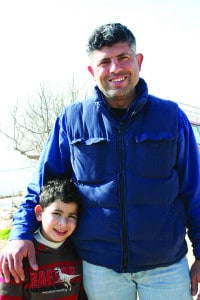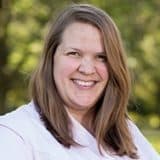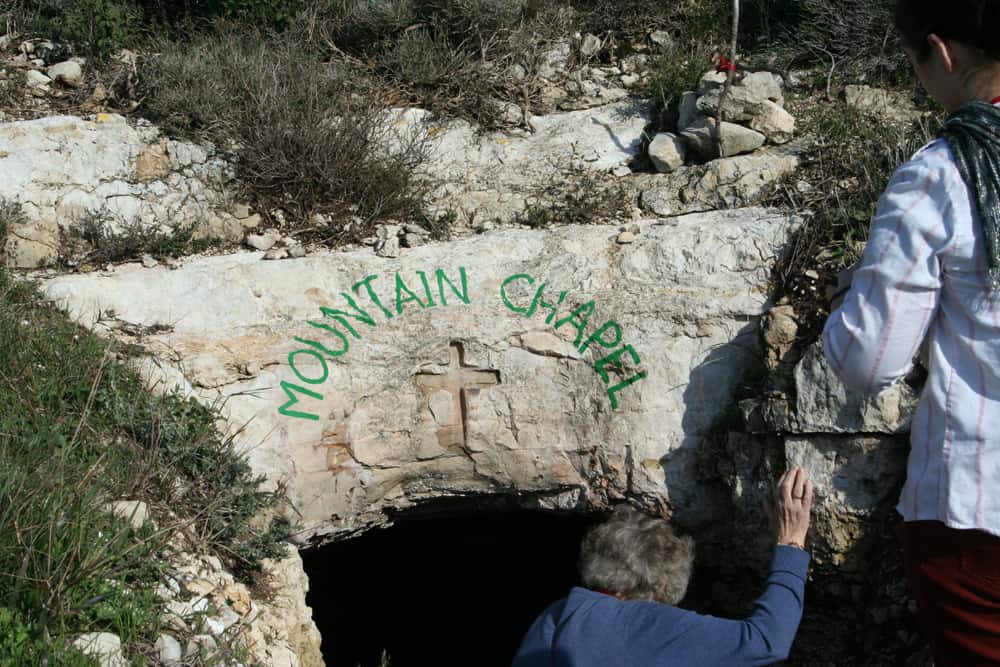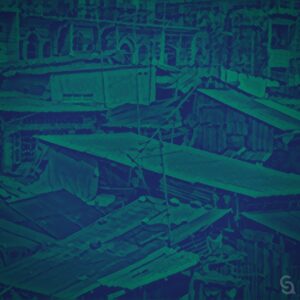Tent of Nations is a 100-acre organic farm and educational organization that seeks peace and reconciliation in the occupied territories of Palestine.
As our tour bus comes to a slow stop in front of a wall of rocks and rubble, we disembark into the bright, breezy day. We will learn later that the Israeli government built the blockade along this narrow dirt road in 2001 to prevent access to Route 60, one of Israel’s main highways. Our group, a diverse mix of evangelicals from around the world, will need to walk to our destination from here. As an ambler, I stay at the back of the pack, snapping photos of the landscape, including the Israeli settlements that cover every hilltop surrounding this small Palestinian farm. One of the couples in our group is elderly; the husband holds the hand of his blind wife to help guide her over the rocky terrain. I am touched and inspired by their devotion not only to one another but to their commitment to show support to Daoud Nassar, who owns and operates Daher’s Vineyard and the Tent of Nations, a small organic farm and educational organization, which seeks peace and reconciliation in the occupied territories of Palestine.
In a conference room carved out of an underground cave (see photo below), Nassar shares his family’s story. Like many Palestinians, Nassar traces his Christian heritage back to the earliest days of Christianity. In 1916, Nassar’s grandfather bought and registered the land on which their farm stands. The Nassar family has a clear record of land ownership from each of the four governments that have administered the land in the last one hundred years. Despite this, since 1991 the family has been embroiled in an ongoing court battle with the Israeli government over their right to keep and cultivate the 100-acre farm.
Even after 20 years of discrimination and intimidation, Nassar pleas with his visitors to harbor love, not hate: “We refuse to hate because people are created in the image of God. We are not created to hate each other…We are asking you not to be on one side only, but to be on the side of peace and justice, which is for everyone.” In addition to the legal challenges, the family experiences physical and psychological threats from surrounding Israeli settlers; fends off offers to buy the land (“Our land is our mother, and our mother is not for sale,” was Nassar’s reply to a blank-check offer from the Israeli government to abandon his property); and creatively overcomes the systemic abuses of power that prevent the family from access to water, electricity, and the right to renovate or build on their own property.
“When you act in a different way, you confuse the other, and you force them to see you in a different way,” explains Nassar. He continues: “Since we aren’t allowed to build on the ground, we build under the ground.” The underground conference room in which he stands is equipped with wireless internet; its walls were painted by children enrolled in one of the farm’s many summer programs. Supporters from around the world have helped Nassar and his family engage the violence of occupation with peaceful, non-violent resistance. Palestine’s first solar power system is installed on Nassar’s property, a system that allows the farm to use electricity and to maintain a website.
Through their “Plant for Peace” program, the farm has planted 1,280 olive trees this year. Once planted, olive trees must be carefully cultivated, and may not begin to bear fruit for many years. “When you plant a tree, you believe in the future,” says Nassar (pictured below, with his son). Planting olive trees is non-violent resistance. “You won’t see the result tomorrow, but the tree will grow and bear roots.” Like many grassroots movements for peace with justice, “Peace cannot come from up to down, it needs to grow like the olive tree.”
Peace abides in another village, called Aboud, northwest of Ramallah. Here, 2200 people, about half Muslim and half Christian, live and work together peacefully. A small soap factory and a few shops provide income to inhabitants, whose freedom of movement in and out of the town is heavily regulated by the Israeli army. After worshiping in a church many hundreds of years old, our group is hosted for lunch by several local families. Abuna Immanuel, the Orthodox priest, answers our questions and discusses his hopes for the community. “Christians in the Middle East are like salt – they are small, but very tasty,” he says. “This land is big enough to take all of us without killing.” And how can Christians be our most salty? We must remember that “peace is a culture. How to live with peace is a culture.”
Despite their many physical and psychological trials, in addition to their unwavering commitment and cry for peace, Abuna Immanuel, Daoud Nassar, and the dozens of other peacemakers we met during our time in Israel and Palestine had only two requests of their visitors: that we remember this land and its people in our prayers and that we visit, to see for ourselves that “without faith, without love, without hope, nothing can be done here.”
* * *
Think about it: Daoud Nassar asks Christians not to be partisan in their views of the Israel/Palestine conflict, but to “be on the side of peace and justice, which is for everyone.” Think about the issues in your own life which have forced you to take sides. What would peace and justice for everyone look like in that situation?
 Sarah Withrow King is the co-director of CreatureKind and the author of two books, Animals Are Not Ours (No Really, They’re Not): An Evangelical Animal Liberation Theology(Wipf & Stock) and Vegangelical: How Caring for Animals Can Shape Your Faith (Zondervan). This article first appeared on Jesus Radicals and is reprinted with permission.
Sarah Withrow King is the co-director of CreatureKind and the author of two books, Animals Are Not Ours (No Really, They’re Not): An Evangelical Animal Liberation Theology(Wipf & Stock) and Vegangelical: How Caring for Animals Can Shape Your Faith (Zondervan). This article first appeared on Jesus Radicals and is reprinted with permission.



